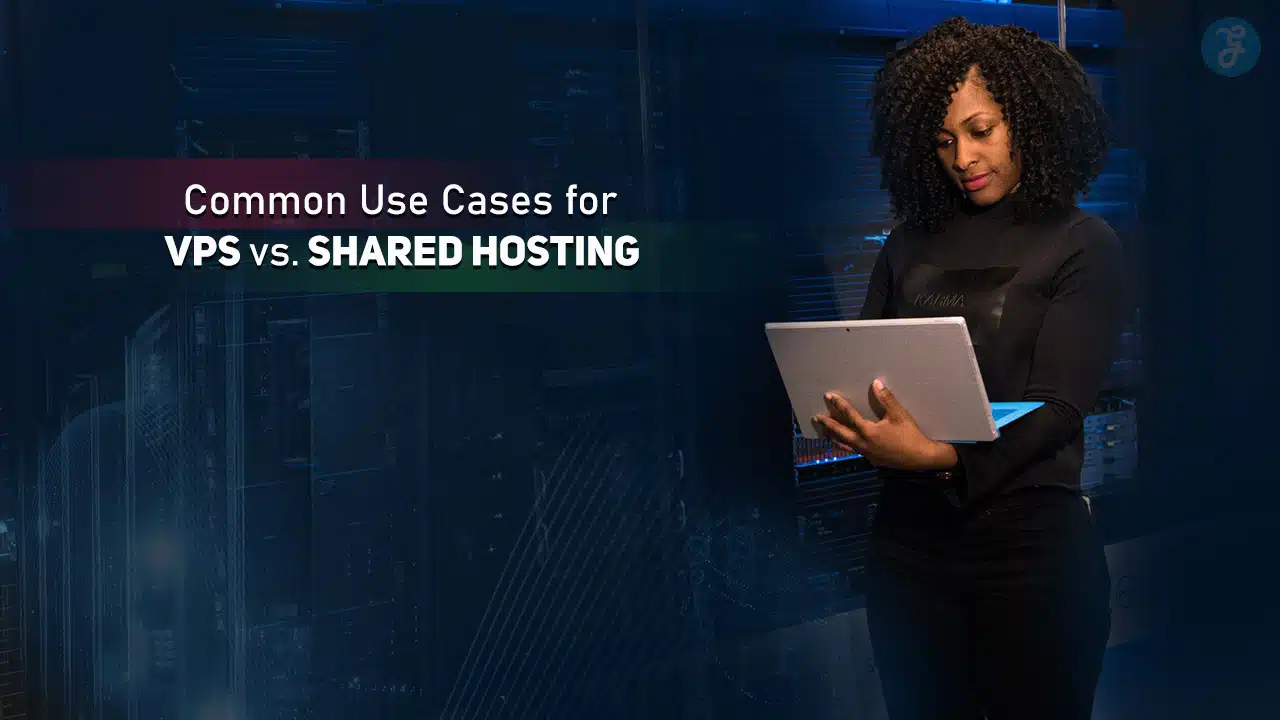Choosing the right hosting solution is one of the most critical decisions when building and managing a website.
While shared hosting and Virtual Private Servers (VPS) are two popular options, they cater to different needs and offer varying levels of performance, scalability, and control.
Understanding the specific use cases for each hosting type can help you decide which one aligns with your website’s requirements and long-term goals.
In this article, we’ll explore 10 common use cases for VPS vs. shared hosting, providing a clear comparison to guide your decision-making process.
1. Hosting Personal Blogs
If you’re starting a personal blog with minimal traffic, shared hosting is a cost-effective solution. It provides the essential features needed to get your website online without the complexities of managing server configurations.
Why Shared Hosting?
- Low cost with basic resources to host a simple blog.
- Easy-to-use control panels for beginners.
- Most providers include one-click installations for popular platforms like WordPress.
Pro Tip: Look for shared hosting providers that offer free SSL certificates and automated backups for added convenience.
VPS Hosting: For Growing Blogs
For bloggers experiencing steady traffic growth or needing advanced customization, VPS hosting is a better fit. It offers more resources and greater control over server settings.
Why VPS Hosting?
- Scalability to handle increased traffic.
- Ability to install custom plugins or scripts.
- Enhanced security for blogs dealing with sensitive information.
Pro Tip: Choose a managed VPS plan if you’re unfamiliar with server administration.
2. E-Commerce Websites
Shared hosting is a good starting point for small e-commerce businesses with a limited number of products. Many shared plans include features like shopping cart integration and SSL certificates.
Why Shared Hosting?
- Low upfront cost for small online stores.
- User-friendly tools for creating and managing e-commerce sites.
- Sufficient for low to moderate traffic levels.
Pro Tip: Ensure your shared hosting provider supports PCI compliance to protect customer payment information.
VPS Hosting: For Larger or Growing Stores
As your e-commerce business expands, VPS hosting becomes essential to handle increased traffic, multiple transactions, and enhanced security.
Why VPS Hosting?
- Dedicated resources ensure faster loading times during high traffic.
- Advanced security measures like firewalls and DDoS protection.
- Flexibility to install custom software, such as advanced inventory management systems.
Pro Tip: Opt for SSD-based VPS hosting to ensure lightning-fast page loading times for a better user experience.
3. Hosting Resource-Intensive Applications
Shared hosting struggles with resource-intensive applications that require significant CPU or RAM. It’s not recommended for running complex software.
Why Shared Hosting?
- Suitable only for lightweight applications with minimal resource demands.
- Best for simple tools like email or basic CMS installations.
Pro Tip: Check resource limitations in shared hosting plans to avoid overloading your server.
VPS Hosting: Optimal for High Performance
VPS hosting is ideal for hosting resource-intensive applications, offering dedicated resources and customization options to optimize performance.
Why VPS Hosting?
- High availability of CPU, RAM, and storage for demanding applications.
- Full root access to configure server settings.
- Stability and reliability for applications like CRMs, ERPs, or analytics platforms.
Pro Tip: Use VPS hosting with a high-bandwidth plan to accommodate data-heavy applications.
4. Website Scalability
Shared hosting offers minimal scalability. If your website grows beyond the allocated resources, you may face slow loading times or downtime.
Why Shared Hosting?
- Best for static websites or small projects with predictable traffic.
- Upgrading typically requires moving to a higher-tier plan or a new hosting type.
Pro Tip: Monitor your website’s traffic to anticipate when you may outgrow shared hosting.
VPS Hosting: Easily Scalable
VPS hosting excels in scalability, allowing you to increase resources as your website grows.
Why VPS Hosting?
- Add more CPU, RAM, or storage as needed.
- Avoid downtime during resource upgrades.
- Suitable for businesses planning long-term growth.
Pro Tip: Choose a cloud-based VPS for seamless scalability and cost-effectiveness.
5. Development and Testing Environment
Shared hosting is not designed for creating development or testing environments due to restrictions on customization and resource allocation.
Why Shared Hosting?
- Works only for basic development of small-scale projects.
- Limited flexibility for deploying custom environments.
Pro Tip: Use shared hosting only for basic demos or prototypes.
VPS Hosting: Perfect for Developers
VPS hosting is a developer’s go-to choice for building and testing applications, offering complete control and flexibility.
Why VPS Hosting?
- Install and configure development tools like Git, Docker, or Node.js.
- Create isolated environments for testing without impacting live websites.
- Experiment with server settings and coding frameworks.
Pro Tip: Use snapshots to quickly roll back changes during testing.
6. High-Traffic Websites
Shared hosting is not equipped to handle high traffic volumes due to limited bandwidth and shared resources.
Why Shared Hosting?
- Works only for low to moderate traffic sites.
- May lead to performance issues during traffic spikes.
Pro Tip: Monitor your bandwidth usage to ensure you stay within plan limits.
VPS Hosting: Designed for Traffic Surges
VPS hosting provides the stability and resources required for high-traffic websites, ensuring consistent performance.
Why VPS Hosting?
- Dedicated resources prevent slowdowns during traffic spikes.
- Faster loading times for a better user experience.
- Ideal for news websites, forums, or popular blogs.
Pro Tip: Use a content delivery network (CDN) with your VPS to distribute traffic efficiently.
7. Hosting Multiple Websites
Shared hosting plans often restrict the number of websites you can host, and adding more can strain resources.
Why Shared Hosting?
- Suitable for hosting a few small websites.
- Limited storage and bandwidth for each site.
Pro Tip: Check for multi-site support in your shared hosting plan.
VPS Hosting: Unlimited Possibilities
VPS hosting allows you to host multiple websites without performance issues, provided you allocate resources effectively.
Why VPS Hosting?
- Allocate resources independently for each website.
- Suitable for businesses managing multiple domains or web developers.
- Increased reliability compared to shared hosting.
Pro Tip: Use control panels like cPanel or Plesk to manage multiple websites easily.
8. Advanced Security Requirements
Shared hosting provides basic security measures, but you’re vulnerable to attacks targeting other users on the same server.
Why Shared Hosting?
- Includes basic protections like SSL certificates and firewalls.
- Suitable for small websites with minimal security needs.
Pro Tip: Regularly update your CMS and plugins to minimize vulnerabilities.
VPS Hosting: Enhanced Security
VPS hosting offers advanced security features, giving you full control to implement additional layers of protection.
Why VPS Hosting?
- Isolated environments protect your data from other users.
- Configure custom firewalls, malware scanners, and encryption protocols.
- Ideal for e-commerce, financial services, and healthcare websites.
Pro Tip: Enable regular backups and two-factor authentication for added security.
9. Streaming Services
Shared hosting is not recommended for hosting video or audio streaming services due to bandwidth and resource limitations.
Why Shared Hosting?
- Works only for embedding external streams.
- Limited storage for large media files.
Pro Tip: Use shared hosting to showcase links to streaming platforms like YouTube or Vimeo.
VPS Hosting: Ideal for Hosting Streams
VPS hosting supports streaming services by providing the necessary bandwidth and storage.
Why VPS Hosting?
- Dedicated resources ensure smooth streaming.
- Scalability to handle growing audiences.
- Supports hosting media-heavy websites.
Pro Tip: Optimize your server for streaming by using reliable CDN and compression techniques.
10. Running Custom Applications
Shared hosting is unsuitable for custom applications due to restrictions on software installations and configurations.
Why Shared Hosting?
- Best for pre-built CMS platforms like WordPress or Joomla.
- Limited access to server configurations.
Pro Tip: Use shared hosting only for simple, out-of-the-box solutions.
VPS Hosting: Unlimited Customization
VPS hosting gives you the freedom to install and run custom applications, making it ideal for businesses with specific software needs.
Why VPS Hosting?
- Full root access for custom software installations.
- Configure server settings to optimize performance.
- Perfect for SaaS platforms or specialized tools.
Pro Tip: Choose a managed VPS plan to focus on application development rather than server management.
Conclusion
Understanding the differences between VPS and shared hosting helps you choose the best solution for your website or project.
While shared hosting is ideal for beginners or small-scale needs, VPS hosting is the go-to option for businesses and developers requiring flexibility, scalability, and high performance.
These 10 common use cases for VPS vs. shared hosting highlight the scenarios where each hosting type excels. Evaluate your current needs and long-term goals to make an informed decision, ensuring your website thrives in the digital landscape.






































